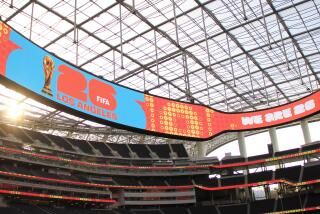Fight to the Finish
It was in Ouagadougou, of all places, where it all began.
There, in the capital of Burkina Faso some 28 months ago, South Africa officially announced it would bid to stage soccer’s 2006 World Cup.
“It is time that we had a chance to show that the African continent can also play host to the biggest sporting event in the world,” said Danny Jordaan, secretary-general of the South African Football Assn.
“In the history of the World Cup, nine [tournaments] have been granted to Europe, four to South America, three to North America and the 2002 event goes to Asia. Africa also must be given a chance to host the tournament.”
On Thursday, it is expected to be handed that opportunity.
That’s when the 24 men who make up the executive committee of FIFA, world soccer’s governing body, will gather at the Messe Conference Centre in Zurich, Switzerland, to choose between the remaining four candidates in what was once a nine-nation race.
The committee is almost certain to select South Africa over Germany in a close vote, with England and Morocco trailing.
The potential history-making decision will bring to a close one of the most expensive and rancorous World Cup campaigns in recent memory. It will also significantly impact the United States’ hopes of hosting the tournament in 2014.
South Africa was not always the favorite.
The 2006 tournament was viewed as likely to return to Europe after the 2002 event was granted to Japan and South Korea. In recent weeks, however, England’s campaign has self-destructed and Germany has been politically out-maneuvered by South Africa.
But that’s getting ahead of the story, which has its origin more than half a decade ago.
Germany, a three-time world champion, was the first country to signal its intention of trying to land the 2006 World Cup, doing so as far back as 1993. Slowly, others followed suit.
Argentina and Australia flirted briefly with seeking the tournament but eventually made no formal bid.
In the end, eight countries set out in search of the World Cup: Brazil, Egypt, England, Germany, Ghana, Morocco, Nigeria and South Africa.
Mexico, ludicrously claiming a clerical error and a postal delay, sent its bid in one month after the deadline only to see it summarily rejected by FIFA.
Egypt, Ghana and Nigeria withdrew from the race early on, leaving five candidates, only three of which had a realistic chance.
Brazil’s bid was undermined from the start by the country’s roller-coaster economy and even more so by a furious attack on it from Pele, who claimed it was “a complete waste of money.”
Soccer’s most recognizable figure lambasted Ricardo Teixeira, president of the Brazilian Football Confederation (CBF), for dragging Brazil into a costly campaign that could not be won.
“[Teixeira] can’t keep on talking nonsense,” Pele said. “He has to work for the benefit of sport. Brazil has not got any stadium, any pitch, which is suitable to stage a World Cup match or meet the conditions set down by FIFA. It’s time to stop deceiving the people.”
Morocco’s bid, meanwhile, was based more on hope than reality. Morocco finished second in the voting behind the United States in the campaign to stage the 1994 World Cup and also lost in the vote for the 2002 event.
Those twin setbacks led to some bitterness this time around.
“By reviewing what happened over the last 10 years we can be concerned,” said Driss Benhima, vice-chairman of the Moroccan bid.
“In 1994 it was the United States, the world’s richest country. In 1998 it was France, the fourth-richest, and in 2002 it’s Japan, the third [-richest].
“Are FIFA [in 2006] going to give the organization to Germany or England, who are respectively the second- and the fifth-richest countries of the world?
“We must know whether you must belong to the small club of highly developed nations to have the privilege.”
Such attitudes aside, Morocco stands little chance in Thursday’s vote. King Mohammed might have pledged $560 million to upgrade the country’s sports facilities and modernize Morocco’s infrastructure, but the work should have been completed before Morocco bid, not as a condition of winning the bid.
South Africa tried to get Morocco to withdraw, but the kingdom adamantly refused. On Thursday, Morocco will gain a handful of votes on the first ballot in Zurich, but those votes will switch to South Africa if a second round of voting is needed and probably will give South Africa the 13 votes required to win.
The South Africans were more successful in getting Brazil to pull out. They offered Africa’s support should Brazil seek the 2010 World Cup in exchange for South America’s support this time.
Brazil went for it like a hungry dog to a bone.
“We will work for our vote to go to South Africa and for us to have their support in 2010,” the CBF’s Teixeira said in Rio de Janeiro on Monday while announcing Brazil’s withdrawal from the race.
“South Africa will win, probably in the first round,” he added.
The last-minute move by Brazil angered Germany, which was running neck and neck with South Africa until that point.
“This is horse-trading directed against us,” said Franz Beckenbauer, who led West Germany to its 1974 World Cup victory as a player and to its 1990 victory as a coach and who now heads Germany’s bid.
“When we heard about what happened, we wondered whether we should continue, but we have decided to carry on and we will see.”
Earlier, Beckenbauer had questioned South Africa’s ability to stage the tournament successfully.
“I think it does have to be in Africa,” he said. “But it’s a question of when? We have to ask, ‘Is Africa ready?’ Are they ready? I don’t know.”
The South African deal with Brazil puts the Brazilians in good stead for 2010, considering they would have seven votes (three South American and four African) already locked up. But it potentially hurts U.S. chances because there is no way that Europe would allow four tournaments in a row (2002, 2006, 2010 and 2014) to be held outside its borders. A 20-year wait between France ’98 and 2018 is unthinkable.
All that Europe, which has eight votes, would need to do to assure itself the 2014 tournament would be to secure the support of Asia (four votes) and Oceania (one vote) and the U.S. bid would be scuttled.
Meanwhile, Europe appears to have sabotaged its chances this time around by fielding two strong candidates instead of one. England and Germany have, without question, faultless bids in terms of their ability to stage the event and have spent tens of millions of dollars on their respective campaigns.
“If the World Cup was only there to improve the already well-established value of football, Germany and England would be excellent choices,” said Joseph “Sepp” Blatter, FIFA’s president.
But Blatter, like his predecessor Joao Havelange, has long said he favors an African nation hosting the 2006 tournament.
The long-standing rivalry between England and Germany became increasingly ugly and ill-tempered as the campaign wore on. But Germany pulled ahead in the last month when England sustained consecutive blows.
First there was the well-publicized hooliganism by English fans at the recently concluded European Championship in Belgium and the Netherlands. That, coming on the heels of 25 years of similar outrageous behavior, cost England votes.
Then a confidential FIFA report analyzing the strengths and weaknesses of the candidates was somehow “leaked.” Prepared by a FIFA committee headed by Los Angeles attorney and former U.S. Soccer president Alan Rothenberg, it suggested that England’s bid is technically inferior to those of Germany and South Africa.
The English were furious.
“I couldn’t really believe it when I was told that the FIFA report says that our bid is technically worse than anyone else’s,” said Sir Bobby Charlton, a World Cup winner as a player in 1966 and ambassador for England’s bid to stage the 2006 tournament.
“Being told our bid is second class when you know you are the best is an insult to everyone involved.”
Tony Banks, former British sports minister and a special government envoy to England’s 2006 bid, was even less subtle.
“It is time to unplug some deaf ears [among European members of FIFA’s executive committee] so that they don’t sleepwalk their way into handing another continent the World Cup, which will not return to Europe for many years,” he said.
But South Africa still has an ace up its sleeve.
Nelson Mandela, the 81-year-old former South African president, is expected to be in Zurich today to make one final appeal on behalf of his country. Mandela spent the early part of this week courting additional votes.
“I think we can count only on 12 and we are now trying to get one more,” Mandela said Tuesday in an interview with the South African Broadcasting Corp. “I have been asked . . . to phone two countries, which I am busy with. It may better for us not to . . . identify the countries in public. We will be speaking to them.”
South African bid officials have long argued that giving South Africa the 2006 tournament would honor Mandela, an avid soccer fan who spent 27 years in prison during the apartheid era, then led his nation toward democracy.
All of which has left supporters of the England and Germany bids ruefully recalling a remark made by Beckenbauer two years ago.
“I just hope that, if two are fighting, there isn’t going to be a third party who gets the last laugh,” he said.
Right now, they are starting to chuckle in Cape Town, Durban, Johannesburg and all across South Africa.
Jack Warner, president of FIFA’s North and Central American and Caribbean region (CONCACAF), which also supports South Africa, said it best just last month:
“I think the people of South Africa are going to be very happy on July 6.”
(BEGIN TEXT OF INFOBOX / INFOGRAPHIC)
WORLD CUP: 2006 TIMELINE
On Thursday, the executive committee of FIFA, world soccer’s governing body, is expected to select South Africa as the host nation for the 2006 World Cup. How it came down to South Africa and the other final candidates--England, Germany and Morocco:
* November 1998: Brazil, Egypt, England, Germany, Ghana and Nigeria submit formal bids to FIFA.
* December ‘98: Morocco and South Africa submit formal bids to FIFA.
* March ‘99: FIFA rejects a late bid by Mexico.
* April ‘99: Egypt and Ghana withdraw their candidacy.
* May ‘99: Nigeria withdraws.
* July ‘99: Submission of detailed written bids by the five remaining candidates.
* December ‘99-February 2000: FIFA on-site inspection tour of the five candidate countries by Alan Rothenberg-led committee.
* March 2000: Rothenberg committee evaluations submitted to FIFA.
* Monday: Brazil withdraws its candidacy.
* Thursday: FIFA’s executive committee will select one of the four remaining candidates.
OTHER SITES
The World Cup has never been held in Africa. The tournament has been held nine times in Europe, and will be played for an eighth time outside of Europe in 2002. The host countries:
1930 URUGUAY
1934 ITALY
1938 FRANCE
1942 Not held
1946 Not held
1950 BRAZIL
1954 SWITZERLAND
1958 SWEDEN
1962 CHILE
1966 ENGLAND
1970 MEXICO
1974 WEST GERMANY
1978 ARGENTINA
1982 SPAIN
1986 MEXICO
1990 ITALY
1994 UNITED STATES
1998 FRANCE
2002 SOUTH KOREA/JAPAN
Those Making the Decision
This is FIFA’s 24-member executive committee, which will vote Thursday in Zurich, Switzerland, on where the 2006 World Cup will be held. The candidates are England, Germany, Morocco and South Africa:
CONTINENT (votes): SOUTH AMERICA (3)
Name: Julio Grondona
Country: Argentina
Likely to support: South Africa
*
Name: Ricardo Teixeira
Country: Brazil
Likely to support: South Africa
*
Name: Nicolas Leoz
Country: Paraguay
Likely to support: South Africa
*
CONTINENT (votes): ASIA (4)
Name: Chung Mong-joon
Country: South Korea
Likely to support: Germany
*
Name: Abdullah Al-Dabal
Country: Saudi Arabia
Likely to support: Morocco
*
Name: Mohammed Bin Hammam
Country: Qatar
Likely to support: Morocco
*
Name: Worawi Makudi
Country: Thailand
Likely to support: Germany
*
CONTINENT (votes): CONCACAF (3)
Name: Jack Warner
Country: Trinidad & Tobago
Likely to support: South Africa
*
Name: Chuck Blazer
Country: United States
Likely to support: South Africa
*
Name: Isaac Sasso Sasso
Country: Costa Rica
Likely to support: South Africa
*
CONTINENT (votes): OCEANIA (1)
Name: Charles Dempsey
Country: New Zealand
Likely to support: England
*
CONTINENT (votes): AFRICA (4)
Name: Issa Hayatou
Country: Cameroon
Likely to support: South Africa
*
Name: Slim Aloulou
Country: Tunisia
Likely to support: Morocco
*
Name: Ismail Bhamjee
Country: Botswana
Likely to support: South Africa
*
Name: Amadou Diakite
Country: Mali
Likely to support: South Africa
*
CONTINENT (votes): EUROPE (9)
Name: Joseph Blatter
Country: Switzerland
Likely to support: South Africa
*
Name: David Will
Country: Scotland
Likely to support: England
*
Name: Lennart Johansson
Country: Sweden
Likely to support: Germany
*
Name: Antonio Matarrese
Country: Italy
Likely to support: Germany
*
Name: Michel D’Hooghe
Country: Belgium
Likely to support: Germany
*
Name: Per Omdal
Country: Norway
Likely to support: Germany
*
Name: Senes Erzik
Country: Turkey
Likely to support: Morocco
*
Name: Angel Villar
Country: Spain
Likely to support: England
*
Name: Joseph Mifsud
Country: Malta
Likely to support: England
THE VOTING PROCESS
A total of 13 votes is required for a candidate to get the World Cup bid. The candidate with the fewest votes is eliminated at the end of the first round of voting, which continues until a majority is achieved.






